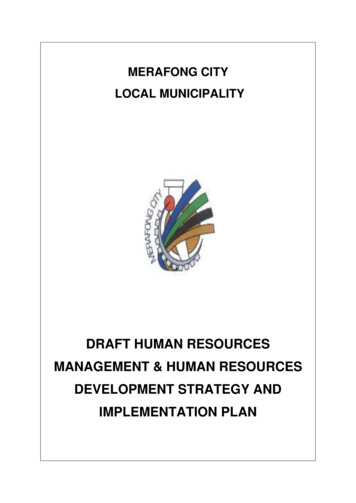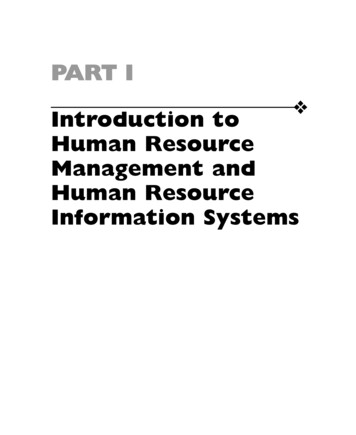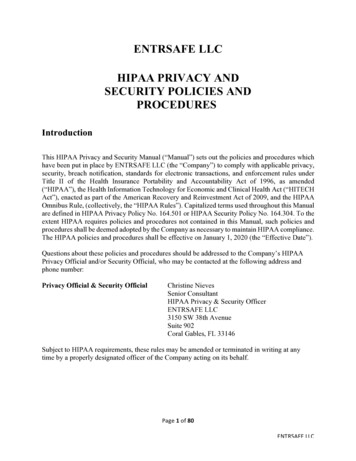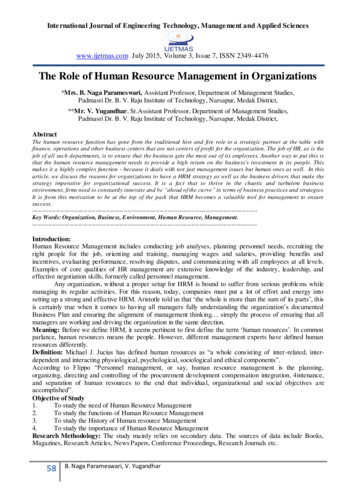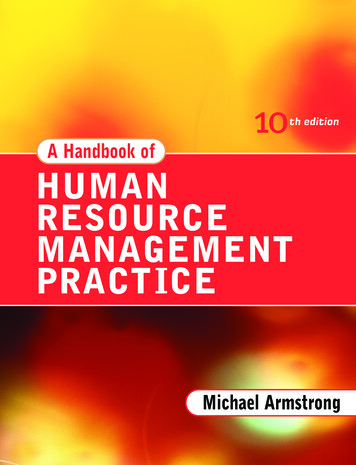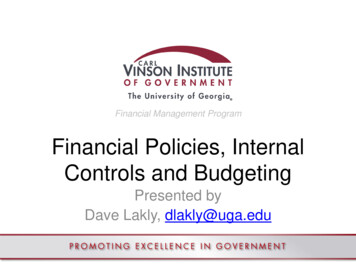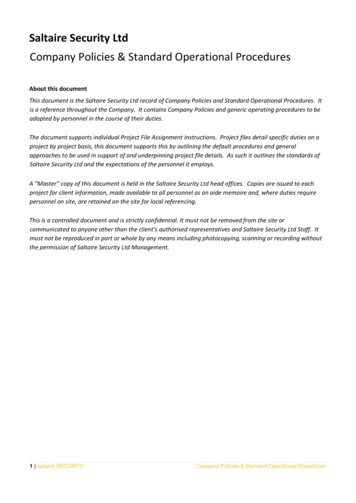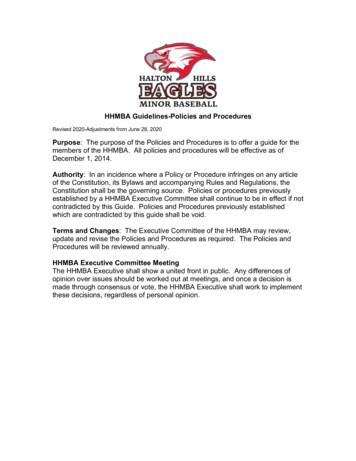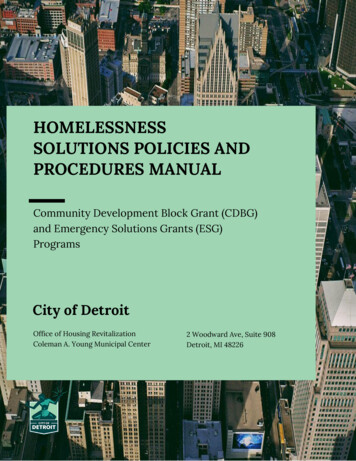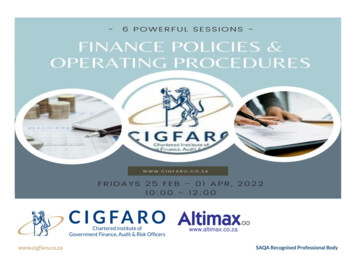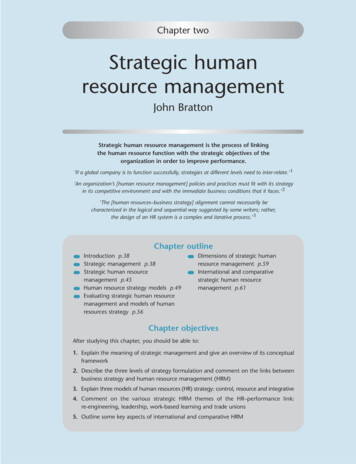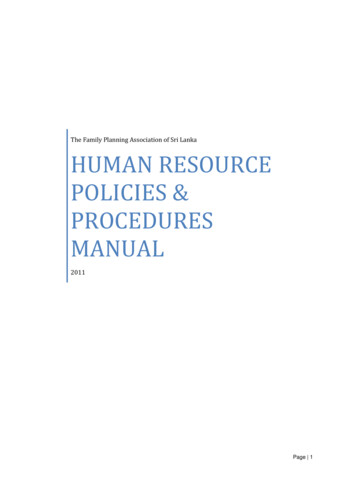
Transcription
The Family Planning Association of Sri LankaHUMAN RESOURCEPOLICIES &PROCEDURESMANUAL2011Page 1
ContentsINTRODUCTION. 61. PRINCIPAL LAWS . 72. POLICIES ON PERSONAL CONDUCT . 72.1 This requires that all employees . 72.2 Dress code policy . 72.3 Policy on Office Mobile Phone . 82.4 Email policy . 92.5 Internet usage Policy. 102.6 Anti – Smoking Policy . 112.7 Alcohol, Narcotics & Other Substance Abuse Policy . 112.8 Gifts & Gratuities Policy . 123. POLICIES ON OFFICIAL CONDUCT . 133.1 Exclusive Service Policy . 133.2 Policy on the conduct of spouse . 133.3 Media Relations Policy . 133.4 Confidentiality Policy . 143.5 Time Keeping Policy . 144.POLICIES ON EQUAL OPPORTUNITIES . 15Objectives . 154.1 Gender Policy . 154.2 Harassment Policy . 154.3 HIV/AIDS Policy . 184.4 Workplace Violence Prevention Policy . 205.POLICIES ON RECRUITMENT & SELECTION . 215.1 Policy on Manpower Plans . 215.2 Policy on Alterations to the Manpower plan . 225.3 Policy on the Employment of relatives . 225.4 Policy on Job Profiles . 225.5 Policy on the Advertising Vacancies . 235.6 Policy on Short-listing applications . 245.7 Information on the Selection Board . 245.8 Policy on Candidate Selection . 245.9 Employment, Pre-Employment formalities . 255.10 Letter of Appointment . 255.11 General Contents of letter of appointment . 265.12 Duration of employment . 27This manual has been approved by the National Council on 4th June 20112 Page
5.13 Offer of employment prior to completion of pre-employment screening . 275.14 Commencement of Employment . 275.15 Probation & Confirmation . 285.16 Employment Types . 295.17 Transfer to another unit & demotions . 316. PROCEDURES FOR THE APPOINTMENT & DISMISSAL OF EXECUTIVE DIRECTOR . 326.1 Hiring the New Executive director . 326.2 Orienting the New Executive Director . 336.3 Dismissal of Executive Director . 337. POLICY ON TERMINATION OF EMPLOYMENT . 347.1 Termination of employment categories . 347.2 Process for Resignation . 347.3 Outstanding Leave . 347.4 Acceptance or Non-acceptance of Resignation . 357.5 Resignation Acceptance Letter . 357.6 Retirement . 357.7 Exit Clearance Process . 357.8 Misconduct & Dismissal . 367.9 Redundancy & Retrenchment . 368. POLICY ON WORKING HOURS, REST DAYS, AND LEAVE . 378.1 Hours of employment . 378.2 Rest Days . 378.3 Shift workers . 378.4 Payment for Weekly Holidays . 378.5 Working on Statuary Holidays and Poya days . 378.6 Statutory Holidays . 378.7 Statutory Holidays coinciding with holidays . 388.8 Statutory Holidays and weekly holidays coinciding with leave . 388.9 Overtime . 388.10 Restrictions on Overtime . 388.11 Payment of overtime . 388.12 Leave. 389. POLICIES ON THE PAYMENT OF SALARIES, ALLOWANCES AND SUPERANNUATION . 429.1 Policies on the payment of Salaries . 429.2 Policy on Salary Advance . 429.3 Policy on the Collection of Salary on Employees Behalf . 429.4 Policy on Festival Advance . 42This manual has been approved by the National Council on 4th June 20113 Page
9.5 Policy on Annual increments . 439.6 Policy on Allowances . 449.7 Policy on SUPERANNUATION . 4510. POLICY ON DEDUCTION FROM REMUNERATION OF AN EMPLOYEE . 4710.1 Definition of ‘Deduction from remuneration’ . 4710.2 Limits of deduction . 4710.3 Classification . 4710.4 Deductions permitted under the Shop and office Employees Act . 4710.5 Disposal of deductions. . 4811. POLICY ON TRAINING & DEVELOPMENT. 4911.1 Objective . 4911.2 Process . 4911.3 Training report . 4911.4 Training identified by individuals . 4911.5 Responsibilities of Human Resources Unit . 5012. POLICY ON STAFF PROMOTIONS & SUCCESSION PLANNING . 5112.1 Objectives. 5112.2 Promotions Procedure . 5112.3 Succession Planning Procedure . 5213. POLICY ON PERFORMANCE MANAGEMENT. 5313.1 Objectives. 5313.2 General Process of Performance Evaluation . 5313.3 The Performance Management Process . 5313.4 Responsibilities of Managers/Supervisors . 5413.5 Performance Improvement Policy . 5414. DISCIPLINARY POLICY . 5614.1 Objectives. 5614.2 Classification of misconduct . 5614.3 Action by Heads of Units . 5615. DISCIPLINARY PROCEDURE . 5715.1 (STEP 1) Preliminary Investigation . 5715.2 (STEP 2) Preparing Show Cause Letter . 5715.2.1 Serving of Show Cause Letter . 5815.2.2 After the receiving the reply to Show Cause Letter . 5815.2.3 Request for extension of time to reply . 5815.6 (STEP 3) Notice of disciplinary inquiry . 5815.7 (STEP 4) Inquiry Proper . 60This manual has been approved by the National Council on 4th June 20114 Page
15.8 Amendment - Additional charges . 6015.9 (STEP 5) Re-opening concluded inquiry. 6115.10 (STEP 6) The Inquiry Report. 6115.11 (STEP 7) Punishments. 6115.12 (STEP 8) Appeal procedure . 6115.13 Employees convicted by a criminal court . 6115.14 Examples of Some major offences . 6215.15 Examples of some minor offences . 6216. GRIEVANCE POLICY . 6312.1 Objectives. 6316.2 Grievance Procedure . 6316.3 Procedure to be followed by a Group of Employees . 6416.4 The Grievance Committee . 6416.5 Terms of Reference for ‘The Grievance Committee’ . 6517. WHISTLE-BLOWER POLICY . 6617.1 Objective . 6617.2 About this policy . 6618. INTELLECTUAL PROPERTY & SECURITY . 6618.1 Objective . 6618.2 About this policy . 6619. RECORDS REQUIRED TO BE MAINTAINED IN RESPECT OF EACH EMPLOYEE . 6719.1 Personal File . 6719.2 Personnel data change . 6719.3 Remuneration Records . 6719.4 Service Record . 6819.5 Time & Leave Record . 6819.6 Records required to be maintained in respect of deductions . 6919.7 Preservation of records . 6919.8 Backups. 69This manual has been approved by the National Council on 4th June 20115 Page
INTRODUCTIONThe Human Resources and Procedure Manual (hereinafter referred to as HR Manual) provides thePolicies & Procedures for managing staff related operations at each stage of the employee life cycle.It also provides guidelines that FPA Sri Lanka will use to administer these policies, with the correctprocedure to follow.The role of HRM (Human Resources Management) includes Manpower Planning. Recruitment,Selection, Induction, Staff Training & Development, Performance Management, Compensation &Benefits, Managing Personal Records, Managing Disputes & Grievances, Implementing DisciplinaryProcedures, Provision of Welfare Facilities, Full & Final Settlement as well as others operations whichdirectly relate to an organization’s employees. The role of HRM is total management of employeesfrom the date of joining to date of resignation and is a decentralized, progressive activity where everyline manager, in his/her capacity, is an HR manager.FPA Sri Lanka shall endeavour to update its HR Manual with industry standards and amendments tolabour regulations. Staff members will be notified to such changes made to the current FPA HRManualQuestions regarding the interpretation of FPA HR Manual should be referred to the National Council(NC) through the Head of HR and/or Executive DirectorNothing contained in or implied by this manual creates or shall be deemed to create or constitute acontractual obligation to employees on the part of FPA Sri Lanka. The policies, procedures andguidelines contained in this manual do not confer any obligation on the part of FPA Sri Lanka, and donot create any right to permanent or continuous employment with FPA Sri LankaThese policies and procedures apply to all employees of FPA Sri Lanka and have been approved bythe National Council of FPA. The National Council and/or the Executive Director reserves the right toactions and initiatives beyond the provisions stipulated in this manual, if and only if such an actionsand initiatives are deemed by him/her to be of strategic and/or operational advantage to FPA, subjectto the condition that such actions and initiatives do not violate the laws, rules and regulations of SriLanka and/or human rights.This manual has been approved by the National Council on 4th June 20116 Page
1. PRINCIPAL LAWSThe following laws regulate the various aspects of employer-employee relationship and this manualhas been modeled after the provisions stipulated in these acts, mainly concentrating on the Shop &Office act.1. Shop & Office Employees Act2. Wages Boards Ordinance3. Employees’ Provident Fund Act4. Employees’ Trust Fund Act5. Payment of Gratuity Act6. Workmen’s Compensation Ordinance7. Industrial Disputes Act8. Termination of Employment of Workmen (special Provisions) act9. Maternity Benefits OrdinanceAdditionally, the following have been strategically merged into this manual where appropriate to givebroader, comprehensive management standards for FPA10. IPPF Accreditation Standards (Principle 7)11. IPPF Sexual Harassment Policy12. IPPF HIV workplace policy2. POLICIES ON PERSONAL CONDUCTFPA Sri Lanka expects its employees to maintain a high standard of conduct and work performance toensure the business maintains good reputation with all stake holders2.1 This requires that all employees1.2.3.4.Comply with all policies and proceduresTreat all co-workers with courtesy and respectTreat all stake holders in a professional mannerAdhere to safely standards2.2 Dress code policyAs a minimum standard, the following is recommended. Please note that this code may not coverevery aspect comprehensively and if management feels that a staff member has dressed orpresented himself/herself inappropriately, he/she will be requested in a more suitable fashion from thefollowing day onwards.FPA Sri Lanka reserves the right to require an employee to dress in the appropriate uniform as acondition of employment.This manual has been approved by the National Council on 4th June 20117 Page
2.2.1GentsMonday – Thursday Office wear - trousers with long sleeve or short sleeve shirt with collar. Tie isrecommended but not essential, except for sales staff. Shoes – Office shoes (minor staff on Grade IV may wear sandals)Friday (promotion day) T-shirt provided by FPA, with a simple denim, or cotton trouser Office shoes (minor staff on Grade IV may wear sandals)2.2.22.2.3Gents should not wear Styled denims, cargo pants, track bottoms, three quarters, shorts, t-shirts of any kind,track shoes, tennis shoes, boots, slippers of any kind, sandals, batik shirts, silk shirts,foreign designer clothes, or any kind of headwear (unless required by religious reasons)ties with cartoons, pictures or logos other than FPA However, slippers may be worn, in the event of injury to foot, or ankle and where it’s notpossible to wear shoes or sandalsLadiesMonday – Thursday Sari, or business suit (pants or skirt) Simple, easy to wear shoes appropriate for an office environment. Rubber slippers are NOT permitted. Moderate level of jewellery is permittedFriday (promotion day) T-Shirt provided by FPA, with a simple denim, cotton trouser or skirt Simple, easy to wear shoes appropriate to an office environmentDuring pregnancy A simple appropriate dress that is neat and tidy2.2.4 2.2.5 Ladies should not wearStyled denims, cargo pants/skirts, track bottoms, three quarters, shorts, t-shirts of any kind,track shoes, tennis shoes, boots, batik shirts, batik skirts, foreign designer clothes, or any kindof headwear (unless required by religious reasons). Blouses with inappropriate or offensivepatterns, and/or sleeveless blouses are not permittedPersonal Grooming CodeNo employee shall have visible tattoos or artificial markings exposed on any part of their bodyNo employee shall wear excessive jewellery, excessive make up, or excessive perfumeNo employee shall wear or display offensive jewellery and/or personal accessoriesEmployees who are provided with uniforms must wear their uniforms during working hoursEmployees who are provided with uniforms shall ensure that their uniforms are, at all times, clean,tidy and well maintained and should inform management if replacements are needed, withinsufficient time to provide the replacementsAll employees shall adhere to dress code provided in office and dress codes specified in programagendas for special events.2.3 Policy on Office Mobile PhoneThe decision on whether or not to issue an official mobile phone is at the sole discretion of the unithead. Requisitions should be made via the unit itself, from its own budget, and ready for use (SIMThis manual has been approved by the National Council on 4th June 20118 Page
and/or handset) when a new employee comes on board, or when an existing employee requires areplacement by a particular date.2.3.1 Official Calls & Reimbursement1. Making and receiving personal phone calls is limited to five minutes for each call, unlessotherwise approved by your manager.2. Maximum allocated amount for official purposes is LKR 800.00 which can be reimbursed fromthe Finance unit, after providing bills3. FPA shall not pay any additional costs as reimbursements other than the allocated amountunless authorized by the unit Head and approved by the Executive Director, subject to thecondition that additional costs shall not include, under any circumstance, costs for personalcalls, and cost of reconnection charges (if applicable)2.3.2Handset/Mobile phone unit1. The official mobile phone must be switched on at all times2. Staff members must program the official numbers of all staff members into their phone, andwhere necessary, the mobile numbers of members of the National Council and relatedgoverning bodies.3. Employees must answer their mobile phone during office hours, unless otherwise indisposeddue to a meeting or programme where the use of mobile phones is not permitted.4. Employees must answer their mobile phone even outside working hours, especially when thecall is from an official source, unless otherwise indisposed due to illness, participating inexaminations or classes where the use of mobile phones is not permitted.5. It shall be considered an offence not to comply with the above regulations6. The immediate supervisor reserves the right to confiscate the mobile of his/her subordinate ifthe mobile phone is not used as per the above guidelines, and submit the same the head ofHR and shall be retained thereof, pending disciplinary action and/or verbal or written warning.7. Staff member is responsible for the safety of the mobile phone and SIM8. Mobile phone maybe replaced/renewed after a period of 2 years9. Damages to mobile phone before this period will not be compensated and the staff membermust undertake to replace with a similar phone (current market value) at his/her own expense10. In case of loss of SIM and/or mobile phone, a police entry must be logged immediately by theemployee and the copy of this must be submitted to HR unit, through the unit head, attachedwith a letter requesting for a replacement SIM. Staff member shall undertake to call themobile service provider and disconnect/de-activate the SIM on the day the SIM and/or mobilephone was misplaced11. FPA management, shall consider it an offence, warranting disciplinary action if a policy entryis not logged and/or if the SIM is not deactivated for lost SIM/Phone2.4 Email policyGiving an email address is at the sole discretion of the unit head. A form should be obtained from ITunit, and be handed over to the HR unit, where HR shall coordinate with the IT unit to make availablethe email facilityAn Email has legal status as a document and may be accepted as evidence in a court of law. Evenwhen it is used for private purposes, FPA Sri Lanka can be held responsible for the contents of emailmessages, including any attachments. Access to employees email account can be demanded as partof legal action in some circumstances.It is therefore important that the official email is used within the following guidelines:1. All employees must respond to official emails if a response is required and shall not exceedthe requested deadline to respond to emails.2. It shall be considered an offence not to reply to official emails, within the requested period oftime.This manual has been approved by the National Council on 4th June 20119 Page
3. No employee shall use his/her personal signature for emails, other than the signatureprovided by FPA Sri Lanka4. Email should mainly be used for formal business correspondence and care should be taken tomaintain the confidentiality of sensitive information. Formal memos, documents and letters forwhich signatures are important, should be issued on FPA Sri Lanka letterhead regardless ofwhether a physical or electronic delivery method is used5. If electronic messages need to be preserved they may be printed out and filed if there is aprovision for it.6. Limited private use of email subject to conditions is permitted, provided that such does notinterfere with or distract from one’s work.7. However, management has the right to access incoming and outgoing email messages todetermine whether such usage or involvement is excessive or inappropriate.8. Non-essential email, including personal messages, should be deleted regularly from the ‘SentItems’, ‘Inbox’ and ‘Delete
6. Workmen's Compensation Ordinance 7. Industrial Disputes Act 8. Termination of Employment of Workmen (special Provisions) act 9. Maternity Benefits Ordinance Additionally, the following have been strategically merged into this manual where appropriate to give broader, comprehensive management standards for FPA 10.

